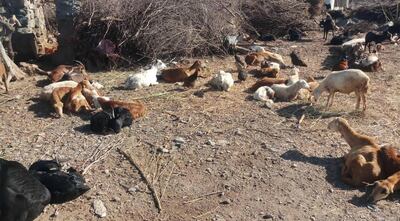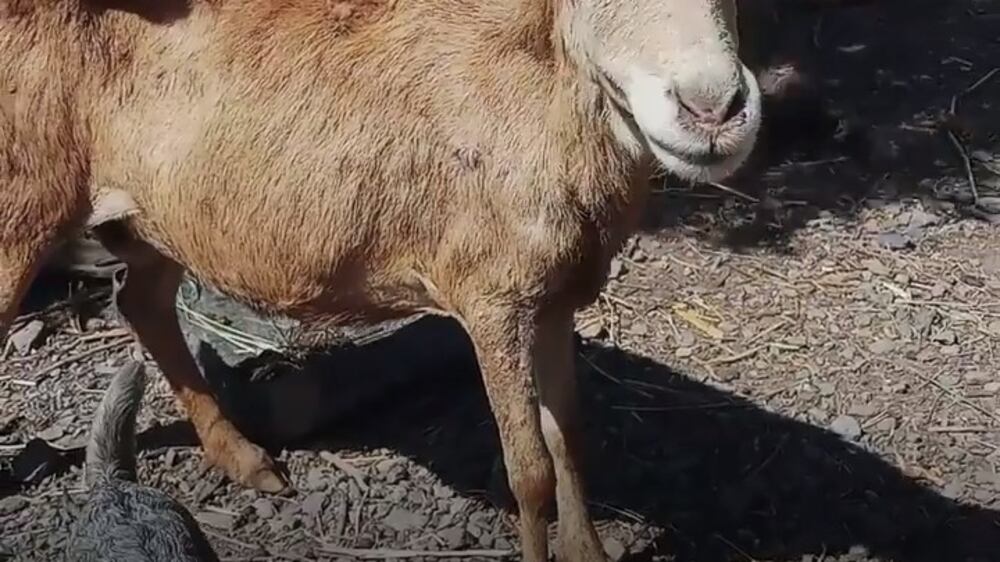A mysterious sickness has stuck hundreds of cattle, sheep and goats in southern Yemen causing concern among herders in areas near the front lines of the five-year war who are unable to stop their livestock dying.
In villages around Hajer, farmers reported losing dozens of animals to the illness they are unable to identify. They report the animals becoming weak, unable to walk or move and then they stop eating and waste away.
"Last week I lost my cow and its newborn calf," Jihad Al Zubaidi, a herder in the area, told The National. "First, the newborn fell sick and died three days after symptoms appeared and two days later, the mother contracted the same infection and died."
But the cows were not the first of Mr Al Zubaidi’s animals to have died.
“I also lost twelve goats, all of them died suffering the same symptoms. In the beginning, the cattle suffer symptoms resembling rickets. They struggle hard to walk but they can’t, and after that, they abandon herding and eating until they die,” he said.

While the farmers are unsure of the cause of the sickness, they say it first appeared after an NGO started distributing livestock to poor families.
“The disease has emerged since an international organisation distributed goats for underprivileged people in a neighbouring village two months ago,” Mr Al Zubaidi claimed.
“One of the beneficiaries who got three goats from the NGO told me that the newly-gifted goats were sick. They infected the ones in good health,” said Mr Al Zubaidi.
No official link has been established between the donated animals and the current blight.
“My neighbour lost more than 40 goats since the infection emerged in the area. It is a real disaster, jeopardising the last source of income we rely on to get the basic necessities for a living because the war has caused huge devastation for our farms,” he added.
Mr Al Zubaidi said that he and other neighbours have visited veterinarians in Al Dhalea city and showed them pictures of the sick cattle, explaining the symptoms. But none of the veterinarians could determine the cause of the animals’ deaths.
“I tried the medications the veterinary surgeon prescribed but it’s no use, the infection kept harvesting my cattle,” he explained.
Mr Al Zubaidi appealed to the UN Organisation of Food and Agriculture (FAO) for urgent help.
“We have been helplessly watching our cattle dying, this is very painful. We need the FAO and the Agriculture Ministry to quickly respond to stop this disaster which has been wreaking havoc with our animals,” he said.
Mohammed Nagi, the general manager of the agriculture office in the province told The National that he has received complaints from herders about the unidentified disease.
“We reported this to the Veterinary Care department in the Agriculture Ministry to help us diagnose this strange disease,” Mr Nagi said.
The same unidentified disease has reportedly also emerged in the coastal province of Shabwa, south-east Yemen, according to Fahd Mabrouk, general manager of the Office of Agriculture in the province of Shabwa.
“We received complaints from citizens living in the districts of Baiyhan, Rodhoum, Arma and Markhah, all of them reporting a strange infectious disease that kills their cattle,'' Mr Mabrouk said.
While the cause of the disease has not been confirmed, Yemen’s environment has been under increasing pressure in recent decades, even before the onset of the recent conflict.
The arid country is one of the most water-stressed in the world, a situation critically affecting living conditions for livestock.
The five-year war has also disrupted animal vaccination programmes, putting the livelihoods of hundreds of thousands of farmers at risk.
Cattle herds have in the past been severely affected by treatable conditions such as Contagious Caprine Pleuropneumonia, according to the FAO, worsening the country’s food security.






